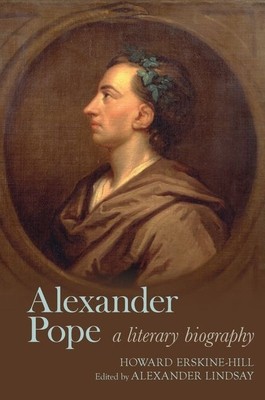
- We will send in 10–14 business days.
- Author: Howard Erskine-Hill
- Publisher: Clemson University Press W/ Lup
- ISBN-10: 1638041091
- ISBN-13: 9781638041092
- Format: 15.2 x 22.9 x 2.4 cm, kieti viršeliai
- Language: English
- SAVE -10% with code: EXTRA
Reviews
Description
This critical biography is a posthumous publication by a Pope scholar of international reputation. It gathers the scholarship and insights of the author's earlier books and essays on Pope into a final work of new research and a lifetime's reflection on its subject, aimed at the informed general reader as well as students and professional scholars.
The book places Pope's life, friendships, and poetry in the context of the political state of Britain following the Revolution of 1688, the year of the poet's birth. It is sympathetic to the revisionist history which argues that Jacobitism was a serious and persistent phenomenon, and brings out more fully than previously the extent of Pope's contact with Catholic and Jacobite circles in England and abroad, giving this biography a distinctive approach and emphasis. Pope's friendships, with both Whigs and Tories, with men and women, are brought into relation to the poetry.
Professor Erskine-Hill gives sensitive close readings of all Pope's major poems, but also of the less commonly explored, notably the translations of Homer and especially of the Iliad. Frequent resort is made to Pope's letters, among the finest of the age, including new items. A final chapter discusses Pope's literary reputation in the later eighteenth-century subsequent to his death.
EXTRA 10 % discount with code: EXTRA
The promotion ends in 23d.00:13:33
The discount code is valid when purchasing from 10 €. Discounts do not stack.
- Author: Howard Erskine-Hill
- Publisher: Clemson University Press W/ Lup
- ISBN-10: 1638041091
- ISBN-13: 9781638041092
- Format: 15.2 x 22.9 x 2.4 cm, kieti viršeliai
- Language: English English
This critical biography is a posthumous publication by a Pope scholar of international reputation. It gathers the scholarship and insights of the author's earlier books and essays on Pope into a final work of new research and a lifetime's reflection on its subject, aimed at the informed general reader as well as students and professional scholars.
The book places Pope's life, friendships, and poetry in the context of the political state of Britain following the Revolution of 1688, the year of the poet's birth. It is sympathetic to the revisionist history which argues that Jacobitism was a serious and persistent phenomenon, and brings out more fully than previously the extent of Pope's contact with Catholic and Jacobite circles in England and abroad, giving this biography a distinctive approach and emphasis. Pope's friendships, with both Whigs and Tories, with men and women, are brought into relation to the poetry.
Professor Erskine-Hill gives sensitive close readings of all Pope's major poems, but also of the less commonly explored, notably the translations of Homer and especially of the Iliad. Frequent resort is made to Pope's letters, among the finest of the age, including new items. A final chapter discusses Pope's literary reputation in the later eighteenth-century subsequent to his death.


Reviews